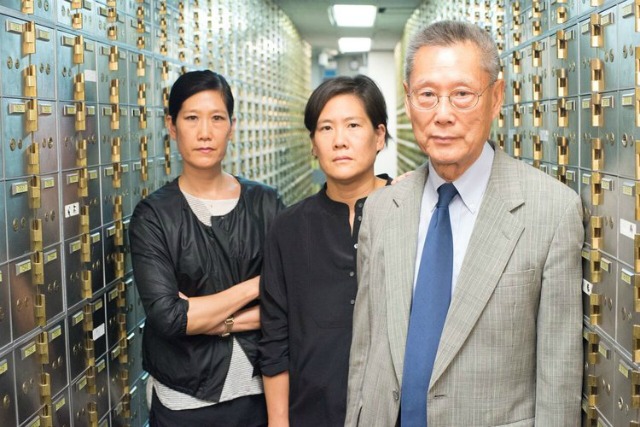In Steve James' 'Abacus,' A 'Small Enough' Scapegoat For The Banking Crisis Fights Back
By Stephen Gossett in Arts & Entertainment on Jun 16, 2017 2:00PM

'Abacus: Small Enough To Jail'
Even after trillions of dollars in toxic loans and a tsunami of populist outrage, there was but a single financial institution to face indictment following the subprime mortgage crisis—and the Great Recession it helped catapult.
Actually, “financial institution” is probably putting it too strongly. It was a small, family-owned bank in the heart of Chinatown, in New York, called Abacus Federal Savings Bank. In his excellent new documentary, director Steve James (Hoop Dreams, The Interrupters) makes a convincing case that they were the scapegoats of prosecutorial zeal, a case in which questions of cultural prejudice and the fairness of the criminal justice system at large are never far from the surface.
Equal parts legal thriller, news-magazine doc and family portrait, Abacus: Small Enough To Jail follows the Sung clan during and after the trial. The bank, founded by patriarch Thomas—a seemingly model-minority first-generation immigrant from Shanghai with a soft spot for It’s a Wonderful Life (seriously)—uncovered wrongdoing among some of its employees and seemingly took the appropriate steps. But it doesn’t take long for the District Attorney to make his presence felt, convinced that the illegalities extend to the top. The small-fish neighborhood lender is socked with some 80 counts, accused of falsifying loan applications to Fannie Mae—even though the bank has an almost comically low default rate. (The jury’s decision is a settled, Google-able fact, but if you don’t already know it, do yourself a favor and don’t cheat.)

'Abacus: Small Enough To Jail'
James’ past docs sometimes play like spectacular trust exercises between filmmaker and subject (the years-long milestone Hoop Dreams being the most famous), which makes the legal-drama trappings perhaps an odd fit. But he still mines intimate family moments and manages to immerse viewers into the Chinatown milieu, emphasizing the bond between bank and the community it serves. James has spoken in the past about his admiration for Barbara Kopple’s you-are-there approach, and he manages to similarly inject a sense of time and place where other filmmakers would be content with a talking-heads-plus-archival footage approach. Meanwhile, journalists Matt Taibbi (Rolling Stone) and Jiayan Fan (The New Yorker) are among the interview subjects on hand to help ably provide context. The various impulses (buoyed by a pulsing-but-meditative score, courtesy of Chicago jazz favorite Joshua Abrams) end up almost inextricable.
There’s a very specific “issue” at root in Abacus—the subprime mortgage crisis and a particular act of apparent scapegoating after the wanting federal response—but there’s more at stake, too. Prosecutors created a public-relations spectacle out of the charge announcement and even, shockingly, in how the accused were led into trial, shackled in a “Stalinist-looking chain gang”—a humiliating pageant that arguably would have been nixed had the defendants not been Asian-American. Not surprisingly, the reliance on cash markets within the Chinatown community is mined as a possible target by the prosecution. The movie isn’t half over before a David vs. Goliath metaphor is invoked. It’s hard to argue with.
At the same time, Abacus wisely doesn’t spend an inordinate amount of energy rehashing or belaboring the sins of the too-big-to-fail banks and the economic turmoil that ensued. (Those docs already exist.) In the long tradition of Kartemquin, which produced the film, there’s a sense of activism but without the stridency common to "advocacy docs", a journalistic rigor (for all of Thomas' Capra-esque sprit, James doesn't shy away from the bank's complicating ambiguities) but with a clear-eyed point-of-view throughout.
Toward the end of the film, jurors in the case are rightfully urged to not look beyond the case at hand: this trial is about one bank, not all banks, the judge instructs. So there’s a bit of irony in that fact that the film bears such a strong sense of universality, despite its specificity to a certain culture and era. The themes are too big, and the approach too thorough, to fail.
'Abacus: Small Enough to Jail' opens Friday at Gene Siskel Film Center. Steve James and producer Mark Mitten will be present for an audience discussion at four screenings.